
generative-ai-cdk-constructs
AWS Generative AI CDK Constructs are sample implementations of AWS CDK for common generative AI patterns.
Stars: 444
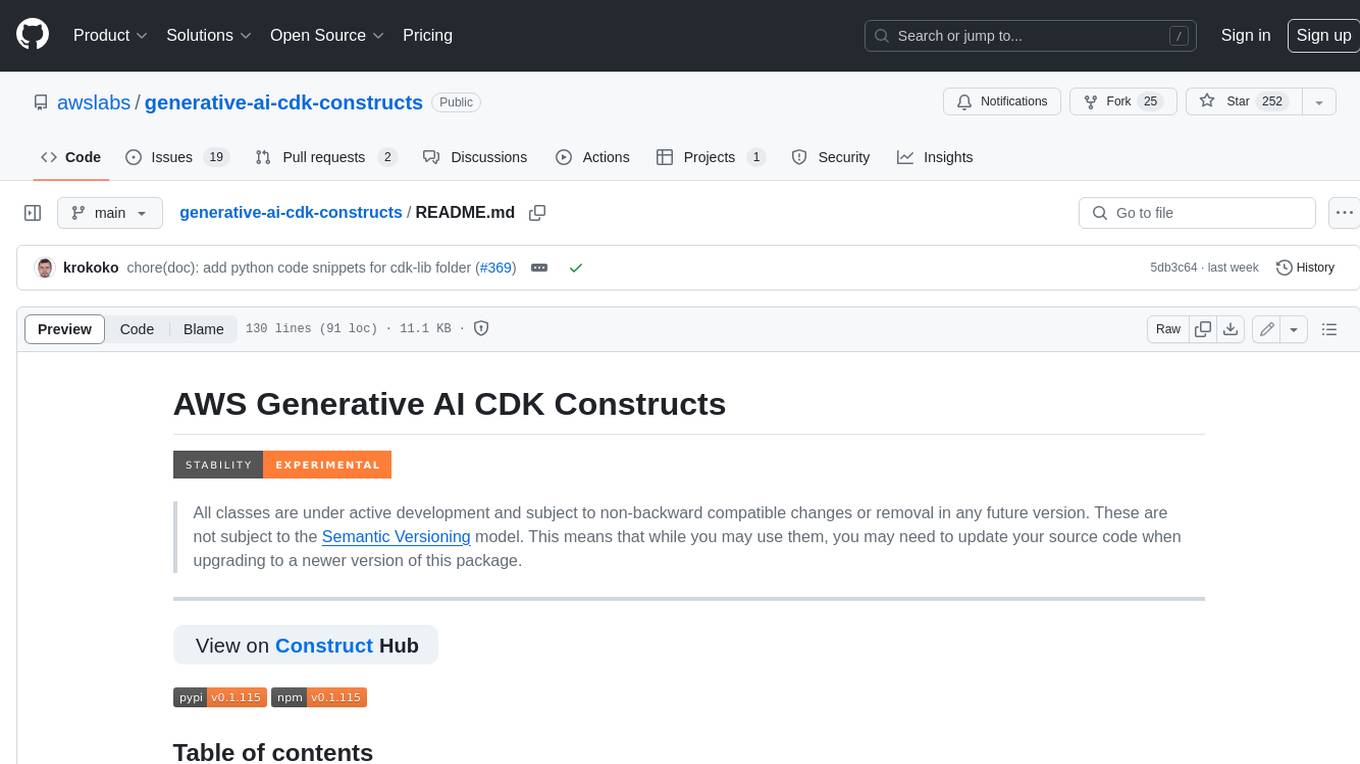
The AWS Generative AI Constructs Library is an open-source extension of the AWS Cloud Development Kit (AWS CDK) that provides multi-service, well-architected patterns for quickly defining solutions in code to create predictable and repeatable infrastructure, called constructs. The goal of AWS Generative AI CDK Constructs is to help developers build generative AI solutions using pattern-based definitions for their architecture. The patterns defined in AWS Generative AI CDK Constructs are high level, multi-service abstractions of AWS CDK constructs that have default configurations based on well-architected best practices. The library is organized into logical modules using object-oriented techniques to create each architectural pattern model.
README:
All classes are under active development and subject to non-backward compatible changes or removal in any future version. These are not subject to the Semantic Versioning model. This means that while you may use them, you may need to update your source code when upgrading to a newer version of this package.
- Introduction
- CDK Versions
- Contributing
- Design guidelines and Development guide
- Getting Started
- Catalog
- Sample Use Cases
- Additional Resources
- Contributors
- Operational Metrics Collection
- Roadmap
- Deprecation
- License
- Legal Disclaimer
The AWS Generative AI Constructs Library is an open-source extension of the AWS Cloud Development Kit (AWS CDK) that provides multi-service, well-architected patterns for quickly defining solutions in code to create predictable and repeatable infrastructure, called constructs. The goal of AWS Generative AI CDK Constructs is to help developers build generative AI solutions using pattern-based definitions for their architecture.
The patterns defined in AWS Generative AI CDK Constructs are high level, multi-service abstractions of AWS CDK constructs that have default configurations based on well-architected best practices. The library is organized into logical modules using object-oriented techniques to create each architectural pattern model.
AWS Generative AI CDK Constructs and the AWS CDK are independent teams and have different release schedules. Each release of AWS Generative AI CDK Constructs is built against a specific version of the AWS CDK. The CHANGELOG.md file lists the CDK version associated with each AWS Generative AI Constructs release. For instance, AWS Generative AI CDK Constructs v0.0.0 was built against AWS CDK v2.96.2. This means that to use AWS Generative AI CDK Constructs v0.0.0, your application must include AWS CDK v2.96.2 or later. You can continue to use the latest AWS CDK versions and upgrade the your AWS Generative AI CDK Constructs version when new releases become available.
Contributions of all kinds are welcome! Check out our contributor guide
If you want to add a new construct to the library, check out our design guidelines, then follow the development guide
TypeScript
- Create or use an existing CDK application in TypeScript.
cdk init app --language typescript
- Run
npm install @cdklabs/generative-ai-cdk-constructs - The package should be added to your package.json.
- Import the library:
import * as genai from '@cdklabs/generative-ai-cdk-constructs';
Python
- Create or use an existing CDK application in Python
cdk init app --language python
- Install the package:
pip install cdklabs.generative-ai-cdk-constructs
- Import the library:
import cdklabs.generative_ai_cdk_constructs
NuGet
- Create or use an existing CDK application in Python
cdk init app --language csharp
- Install the package while in the Visual Studio project:
dotnet add package CdkLabs.GenerativeAICdkConstructs
- Use the namespace:
using Cdklabs.GenerativeAiCdkConstructs;
Go
- Create or use an existing CDK application in Python
cdk init app --language go
- Get the module:
go get github.com/cdklabs/generative-ai-cdk-constructs-go/generative-ai-cdk-constructs
- Import the library:
import "github.com/cdklabs/generative-ai-cdk-constructs-go/generative-ai-cdk-constructs"
NOTE: The Go distribution repository, distributes the JSII tar gzipped versioned source from the source repository
Java
- Create or use an existing CDK application in Java
cdk init app --language java
- Add the dependency into the
pom.xml
<dependency>
<groupId>io.github.cdklabs</groupId>
<artifactId>generative-ai-cdk-constructs</artifactId>
<version>Get the latest version and insert it here</version>
</dependency>
Refer to the documentation for additional guidance on a particular construct: Catalog
The following constructs are available in the library:
| Construct | Description | AWS Services used |
|---|---|---|
| SageMaker model deployment (JumpStart) | Deploy a foundation model from Amazon SageMaker JumpStart to an Amazon SageMaker endpoint. | Amazon SageMaker |
| SageMaker model deployment (Hugging Face) | Deploy a foundation model from Hugging Face to an Amazon SageMaker endpoint. | Amazon SageMaker |
| SageMaker model deployment (Custom) | Deploy a foundation model from an S3 location to an Amazon SageMaker endpoint. | Amazon SageMaker |
| Amazon Bedrock Monitoring (Amazon CloudWatch Dashboard) | Amazon CloudWatch dashboard to monitor model usage from Amazon Bedrock. | Amazon CloudWatch |
| Bedrock Data Automation | Use Amazon bedrock data automation client to to build and manage intelligent document processing, media analysis, and other multimodal data-centric automation solutions | AWS Lambda, Amazon S3 bucket |
| Bedrock Batch Step Functions | Manage Bedrock model invocation jobs(batch inference) in AWS Step Functions state machines | AWS Step Functions, AWS Lambda, AWS EventBridge, Amazon Bedrock, AWS IAM |
| Construct | Description | AWS Services used |
|---|---|---|
| Amazon Bedrock | CDK L2 Constructs for Amazon Bedrock. | Amazon Bedrock, Amazon OpenSearch Serverless, AWS Lambda |
| Amazon OpenSearch Serverless Vector Collection | CDK L2 Constructs to create a vector collection. | Amazon OpenSearch Vector Index |
| Amazon OpenSearch Vector Index | CDK L1 Custom Resource to create a vector index. | Amazon OpenSearch Serverless, AWS Lambda |
The official samples repository includes a collection of functional use case implementations to demonstrate the usage of AWS Generative AI CDK Constructs. These can be used in the same way as architectural patterns, and can be conceptualized as an additional "higher-level" abstraction of those patterns. Those patterns (constructs) are composed together into stacks, forming a "CDK app".
| Resource | Type | Description |
|---|---|---|
| AWS re:Invent 2023 - Keynote with Dr. Werner Vogels | Keynote | Dr. Werner Vogels, Amazon.com's VP and CTO, announces the AWS Generative AI CDK Constructs during his AWS re:Invent 2023 keynote. |
| Workshop - Building Generative AI Apps on AWS with CDK | Workshop | In this workshop, you will explore how to build a sample generative AI app on AWS using CDK and Generative AI CDK Constructs. |
| Workshop - Hands on AWS CDK Generative AI Constructs | Workshop | In this workshop you will deploy projects that use CDK constructs from this library. Projects are from the amazon-bedrock-samples Github Repository. |
| Build generative AI applications with Amazon Titan Text Premier, Amazon Bedrock, and AWS CDK | Blog post + Code sample | Blog post exploring building and deploying two sample applications powered by Amazon Titan Text Premier using the Generative AI CDK constructs. |
| aws-cdk-stack-builder-tool | Code sample | AWS CDK Builder is a browser-based tool designed to streamline bootstrapping of Infrastructure as Code (IaC) projects using the AWS Cloud Development Kit (CDK). |
| CDK Live! Building generative AI applications and architectures leveraging AWS CDK Constructs! | Video | CDK Live! episode focused on building and deploying generative AI applications and architectures on AWS using the AWS Cloud Development Kit (CDK) and the AWS Generative AI CDK Constructs. |
| Announcing AWS Generative AI CDK Constructs! | Blog post | Blog post announcing the release of the AWS Generative AI CDK Constructs. |
| Streamline insurance underwriting with generative AI using Amazon Bedrock | Blog post + Code sample | Blog post and code sample discussing how to use AWS generative artificial intelligence (AI) solutions like Amazon Bedrock to improve the underwriting process, including rule validation, underwriting guidelines adherence, and decision justification. |
| aws-genai-llm-chatbot | Code sample | Multi-Model and Multi-RAG Powered Chatbot Using AWS CDK on AWS allowing you to experiment with a variety of Large Language Models and Multimodal Language Models, settings and prompts in your own AWS account. |
| bedrock-claude-chat | Code sample | AWS-native chatbot using Bedrock + Claude (+Mistral). |
| amazon-bedrock-rag | Code sample | Fully managed RAG solution using Knowledge Bases for Amazon Bedrock. |
| Amazon Bedrock Multimodal Search | Code sample | Multimodal product search app built using Amazon Titan Multimodal Embeddings model. |
| Amazon Bedrock Knowledge Bases with Private Data | Blog post + Code sample | Blog post and associated code sample demonstrating how to integrate Knowledge Bases into Amazon Bedrock to provide foundational models with contextual data from private data sources. |
| Automating tasks using Amazon Bedrock Agents and AI | Blog post + Code sample | Blog post and associated code sample demonstrating how to deploy an Amazon Bedrock Agent and a Knowledge Base through a hotel and spa use case. |
| Agents for Amazon Bedrock - Powertools for AWS Lambda (Python) | Code sample | Create Agents for Amazon Bedrock using event handlers and auto generation of OpenAPI schemas. |
| Text to SQL Bedrock Agent | Code sample | Harnessing the power of natural language processing, the "Text to SQL Bedrock Agent" facilitates the automatic transformation of natural language questions into executable SQL queries. |
| Dynamic Text-to-SQL for Enterprise Workloads with Amazon Bedrock Agent | Code sample | Elevate your data analysis with an end-to-end agentic Text-to-SQL solution, built on AWS for enterprise-scale adaptability and resilience. Ideal for complex scenarios like fraud detection in financial services. |
Generative AI CDK Constructs may collect anonymous operational metrics, including: the region a construct is deployed, the name and version of the construct deployed, and related information. We may use the metrics to maintain, provide, develop, and improve the constructs and AWS services.
Roadmap is available through the GitHub Project
To understand our deprecation process, please refer to the dedicated documentation
Apache-2.0
You should consider doing your own independent assessment before using the content in this library for production purposes. This may include (amongst other things) testing, securing, and optimizing the CDK constructs and other content, provided in this library, based on your specific quality control practices and standards.
© Copyright Amazon.com, Inc. or its affiliates. All Rights Reserved.
For Tasks:
Click tags to check more tools for each tasksFor Jobs:
Alternative AI tools for generative-ai-cdk-constructs
Similar Open Source Tools

generative-ai-cdk-constructs
The AWS Generative AI Constructs Library is an open-source extension of the AWS Cloud Development Kit (AWS CDK) that provides multi-service, well-architected patterns for quickly defining solutions in code to create predictable and repeatable infrastructure, called constructs. The goal of AWS Generative AI CDK Constructs is to help developers build generative AI solutions using pattern-based definitions for their architecture. The patterns defined in AWS Generative AI CDK Constructs are high level, multi-service abstractions of AWS CDK constructs that have default configurations based on well-architected best practices. The library is organized into logical modules using object-oriented techniques to create each architectural pattern model.
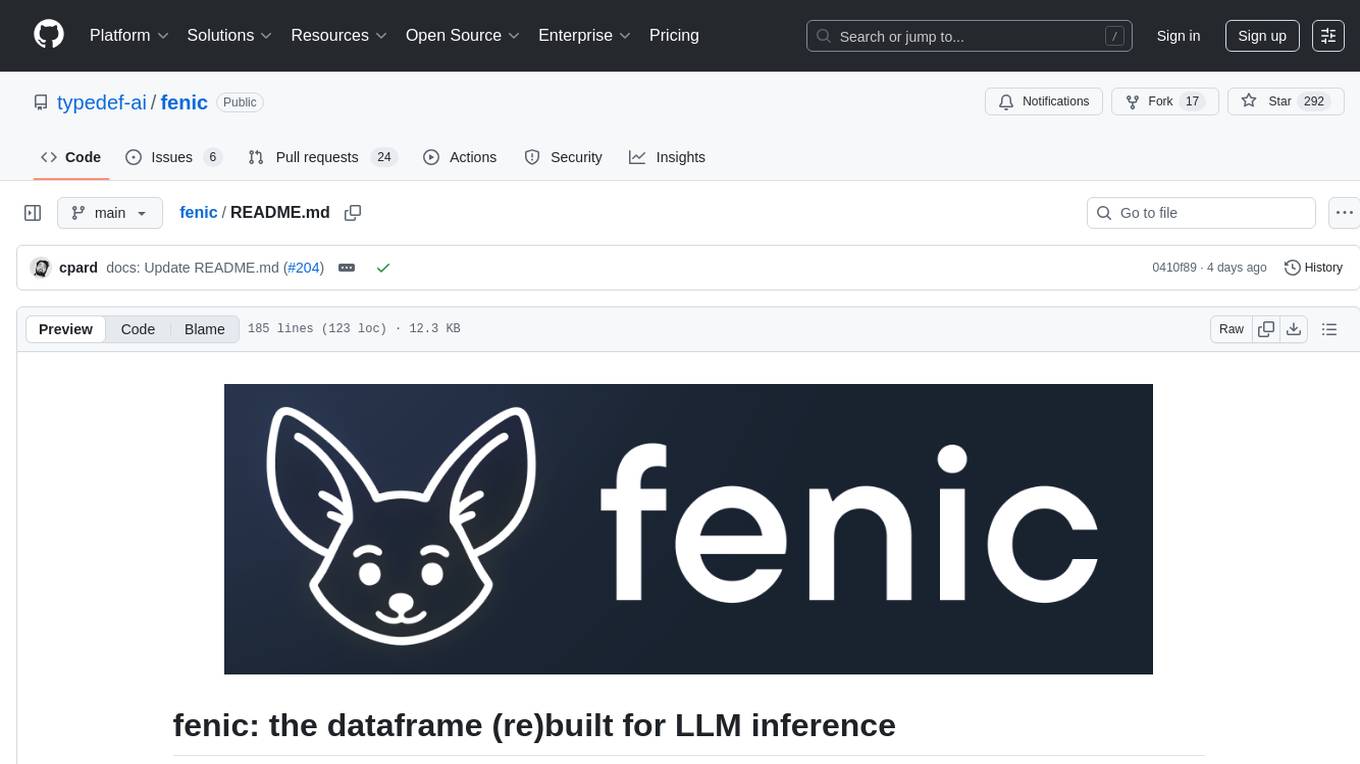
fenic
fenic is an opinionated DataFrame framework from typedef.ai for building AI and agentic applications. It transforms unstructured and structured data into insights using familiar DataFrame operations enhanced with semantic intelligence. With support for markdown, transcripts, and semantic operators, plus efficient batch inference across various model providers. fenic is purpose-built for LLM inference, providing a query engine designed for AI workloads, semantic operators as first-class citizens, native unstructured data support, production-ready infrastructure, and a familiar DataFrame API.
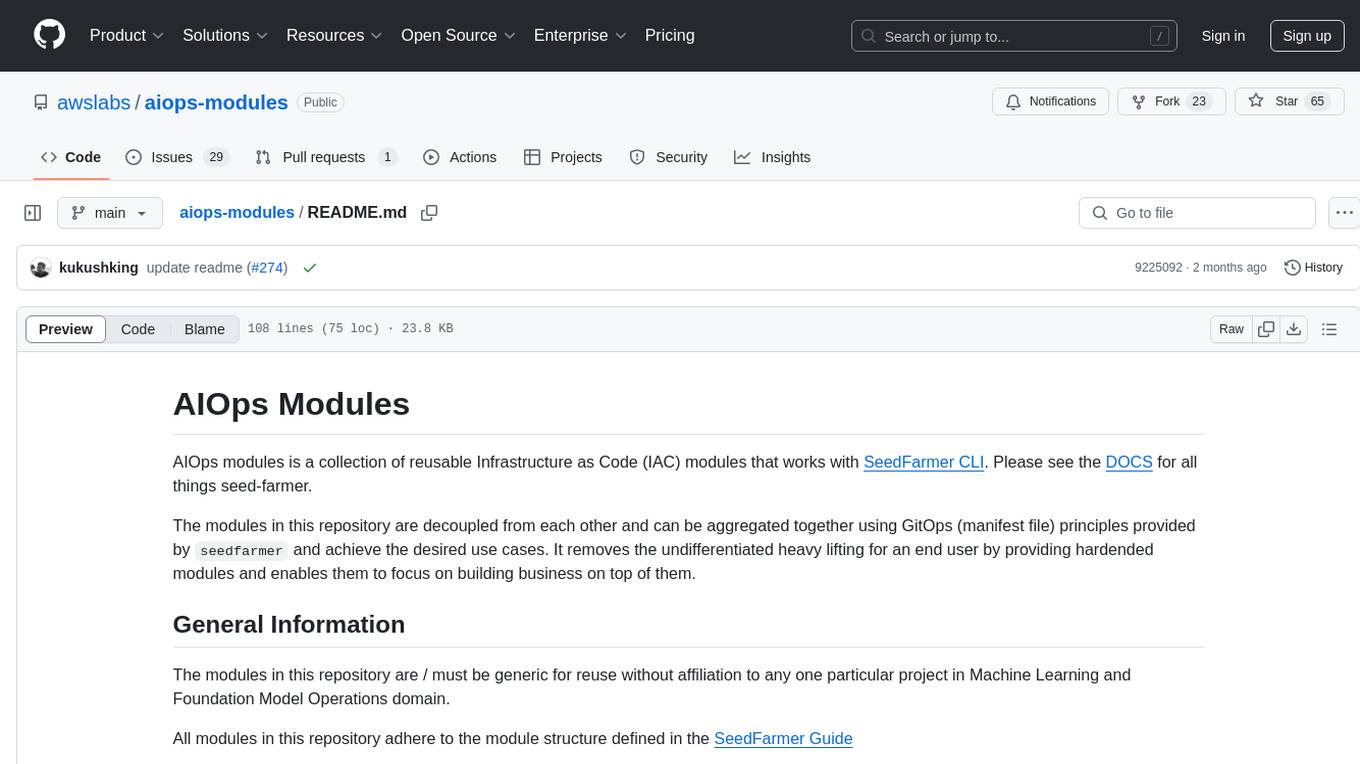
aiops-modules
AIOps Modules is a collection of reusable Infrastructure as Code (IAC) modules that work with SeedFarmer CLI. The modules are decoupled and can be aggregated using GitOps principles to achieve desired use cases, removing heavy lifting for end users. They must be generic for reuse in Machine Learning and Foundation Model Operations domain, adhering to SeedFarmer Guide structure. The repository includes deployment steps, project manifests, and various modules for SageMaker, Mlflow, FMOps/LLMOps, MWAA, Step Functions, EKS, and example use cases. It also supports Industry Data Framework (IDF) and Autonomous Driving Data Framework (ADDF) Modules.
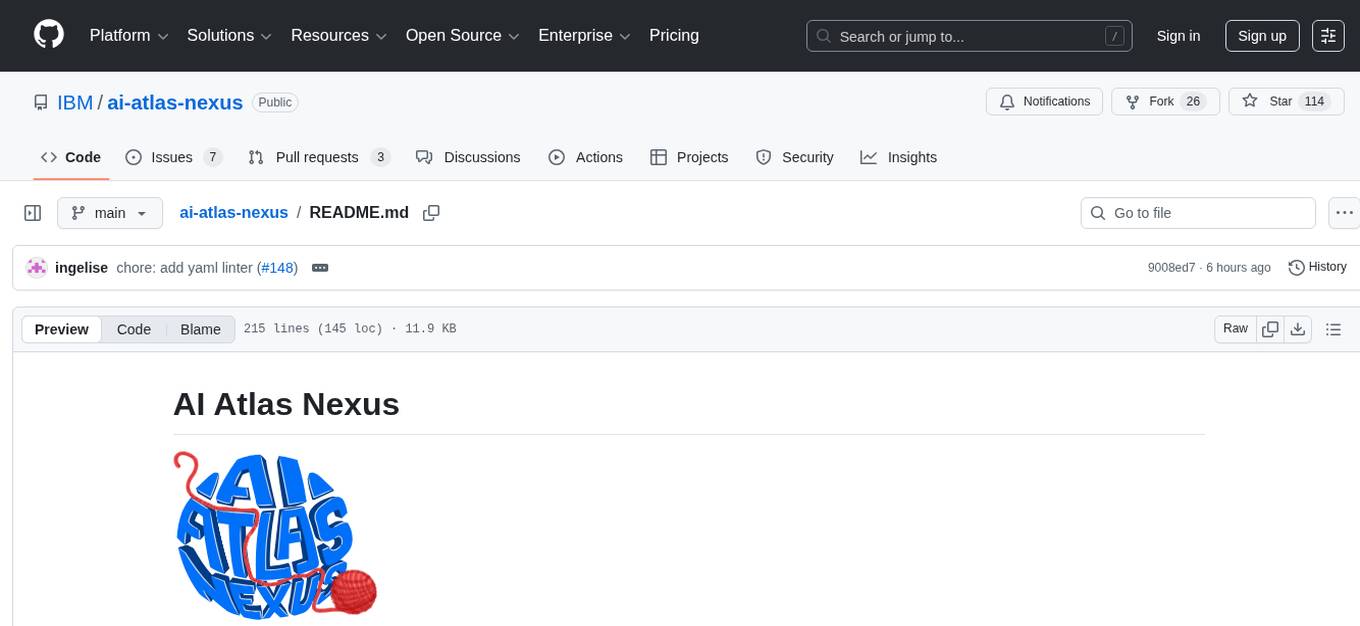
ai-atlas-nexus
AI Atlas Nexus provides tooling to bring together resources related to governance of foundation models. It supports a community-driven approach to curating and cataloguing resources such as datasets, benchmarks, and mitigations. The goal is to streamline AI governance processes by turning abstract risk definitions into actionable workflows. By connecting fragmented resources, AI Atlas Nexus fills a critical gap in AI governance, enabling stakeholders to build more robust, transparent, and accountable systems. The tool builds on the IBM AI Risk Atlas, creating a nexus of governance assets and tooling using a knowledge graph of an AI system to provide a unified structure that links and contextualizes heterogeneous domain data. The project aims to create an open AI Systems ontology focused on risk that the community can extend and enhance, fostering a governance-first approach to AI solutions and inviting contributions to expand its impact.

pluto
Pluto is a development tool dedicated to helping developers **build cloud and AI applications more conveniently** , resolving issues such as the challenging deployment of AI applications and open-source models. Developers are able to write applications in familiar programming languages like **Python and TypeScript** , **directly defining and utilizing the cloud resources necessary for the application within their code base** , such as AWS SageMaker, DynamoDB, and more. Pluto automatically deduces the infrastructure resource needs of the app through **static program analysis** and proceeds to create these resources on the specified cloud platform, **simplifying the resources creation and application deployment process**.
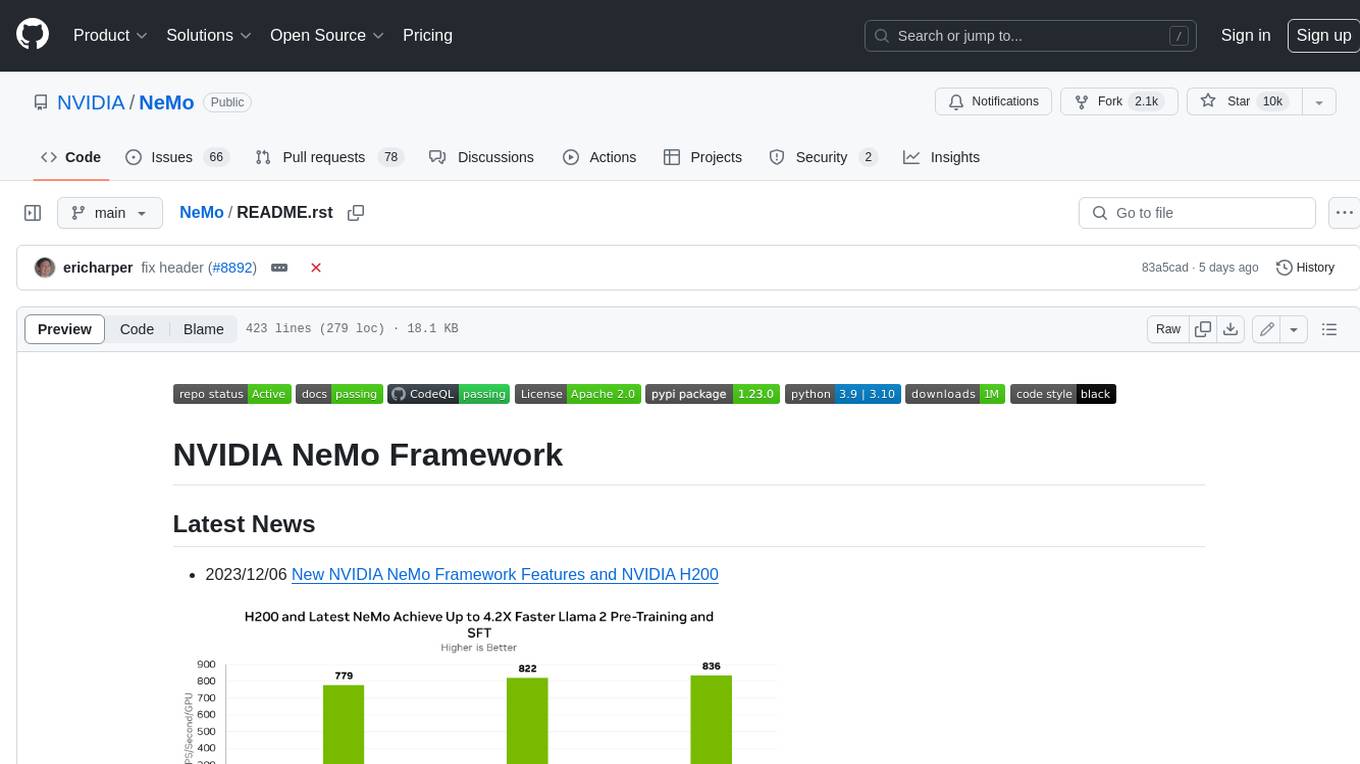
NeMo
NeMo Framework is a generative AI framework built for researchers and pytorch developers working on large language models (LLMs), multimodal models (MM), automatic speech recognition (ASR), and text-to-speech synthesis (TTS). The primary objective of NeMo is to provide a scalable framework for researchers and developers from industry and academia to more easily implement and design new generative AI models by being able to leverage existing code and pretrained models.
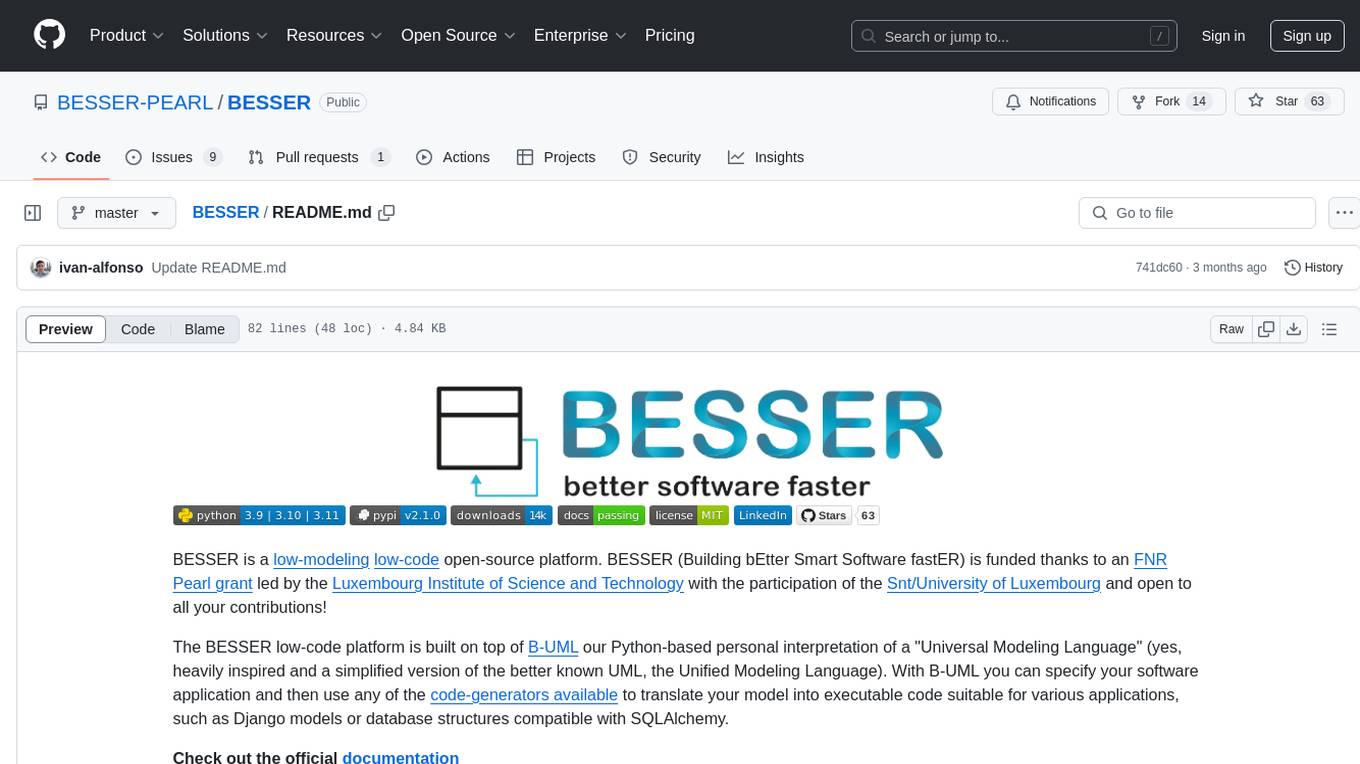
BESSER
BESSER is a low-modeling low-code open-source platform funded by an FNR Pearl grant. It is built on B-UML, a Python-based interpretation of a 'Universal Modeling Language'. Users can specify their software application using B-UML and generate executable code for various applications like Django models or SQLAlchemy-compatible database structures. BESSER is available on PyPi and can be installed with pip. It supports popular Python IDEs and encourages contributions from the community.
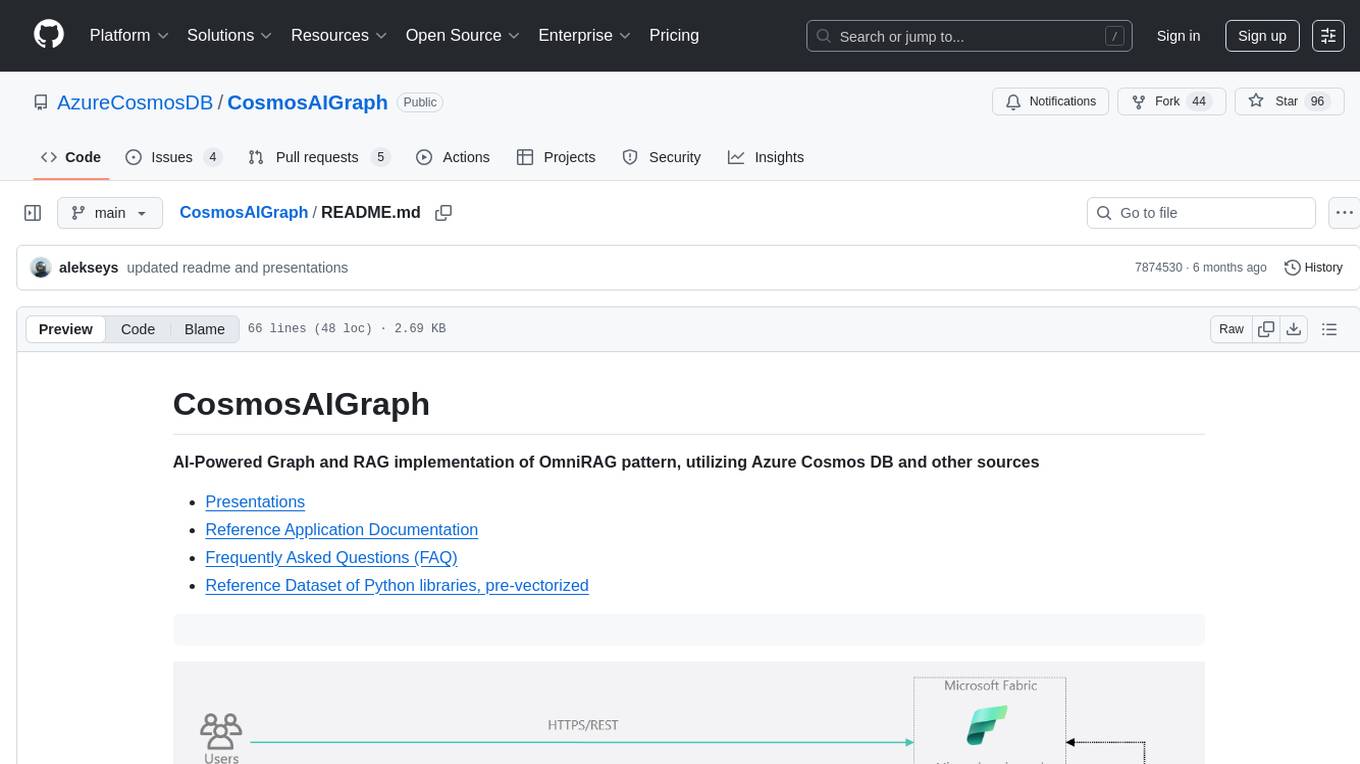
CosmosAIGraph
CosmosAIGraph is an AI-powered graph and RAG implementation of OmniRAG pattern, utilizing Azure Cosmos DB and other sources. It includes presentations, reference application documentation, FAQs, and a reference dataset of Python libraries pre-vectorized. The project focuses on Azure Cosmos DB for NoSQL and Apache Jena implementation for the in-memory RDF graph. It provides DockerHub images, with plans to add RBAC and Microsoft Entra ID/AAD authentication support, update AI model to gpt-4.5, and offer generic graph examples with a graph generation solution.
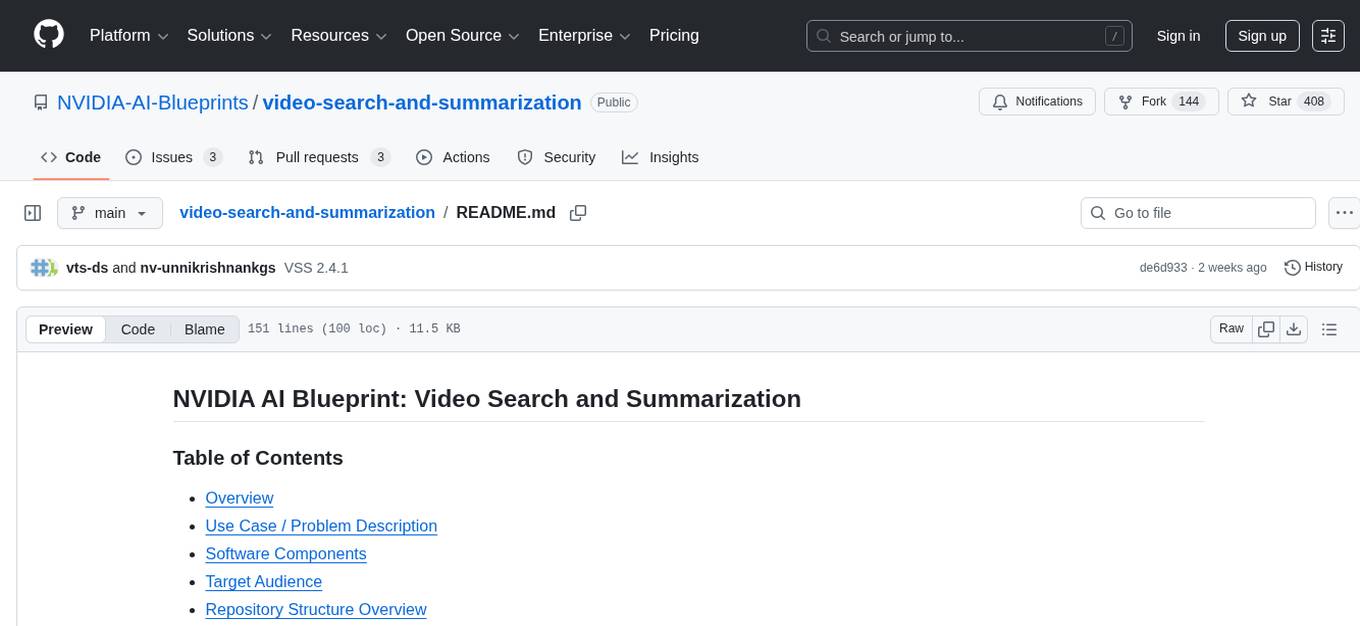
video-search-and-summarization
The NVIDIA AI Blueprint for Video Search and Summarization is a repository showcasing video search and summarization agent with NVIDIA NIM microservices. It enables industries to make better decisions faster by providing insightful, accurate, and interactive video analytics AI agents. These agents can perform tasks like video summarization and visual question-answering, unlocking new application possibilities. The repository includes software components like NIM microservices, ingestion pipeline, and CA-RAG module, offering a comprehensive solution for analyzing and summarizing large volumes of video data. The target audience includes video analysts, IT engineers, and GenAI developers who can benefit from the blueprint's 1-click deployment steps, easy-to-manage configurations, and customization options. The repository structure overview includes directories for deployment, source code, and training notebooks, along with documentation for detailed instructions. Hardware requirements vary based on deployment topology and dependencies like VLM and LLM, with different deployment methods such as Launchable Deployment, Docker Compose Deployment, and Helm Chart Deployment provided for various use cases.
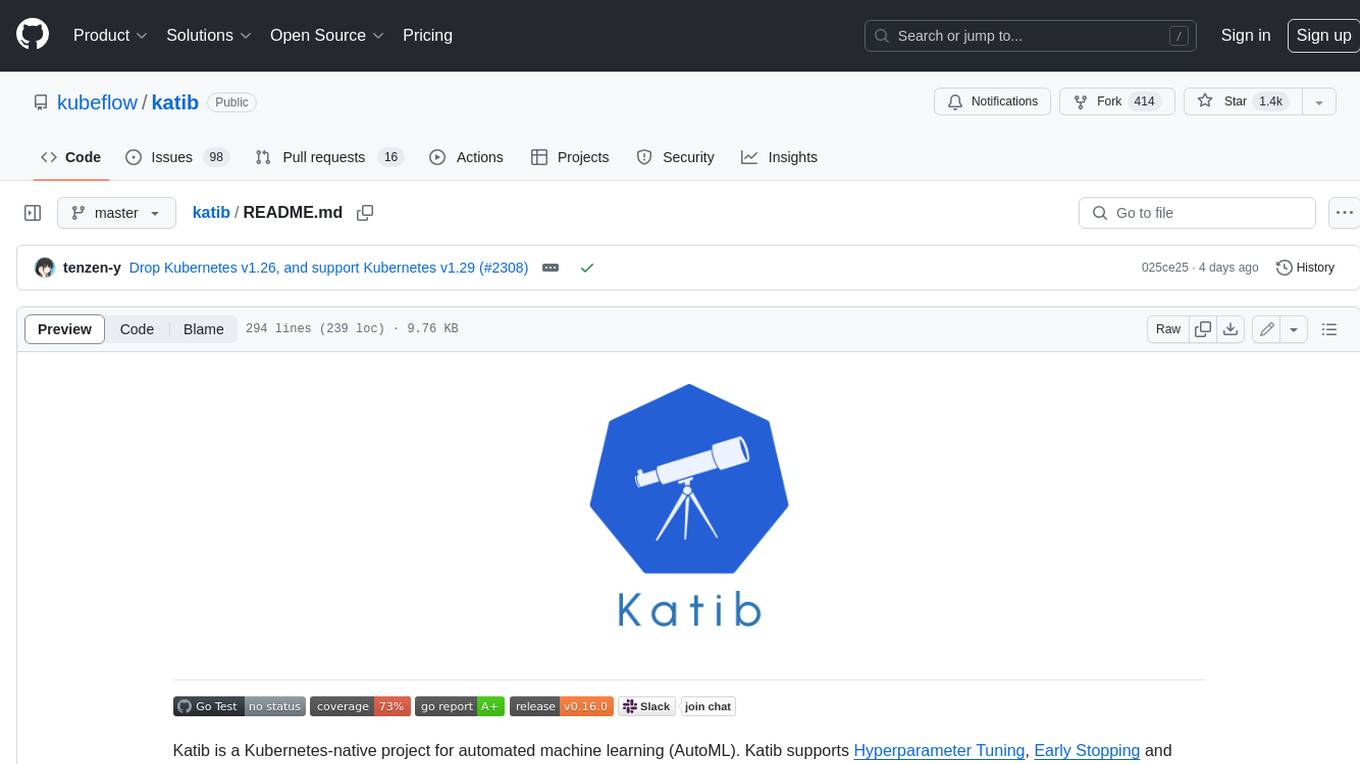
katib
Katib is a Kubernetes-native project for automated machine learning (AutoML). Katib supports Hyperparameter Tuning, Early Stopping and Neural Architecture Search. Katib is the project which is agnostic to machine learning (ML) frameworks. It can tune hyperparameters of applications written in any language of the users’ choice and natively supports many ML frameworks, such as TensorFlow, Apache MXNet, PyTorch, XGBoost, and others. Katib can perform training jobs using any Kubernetes Custom Resources with out of the box support for Kubeflow Training Operator, Argo Workflows, Tekton Pipelines and many more.
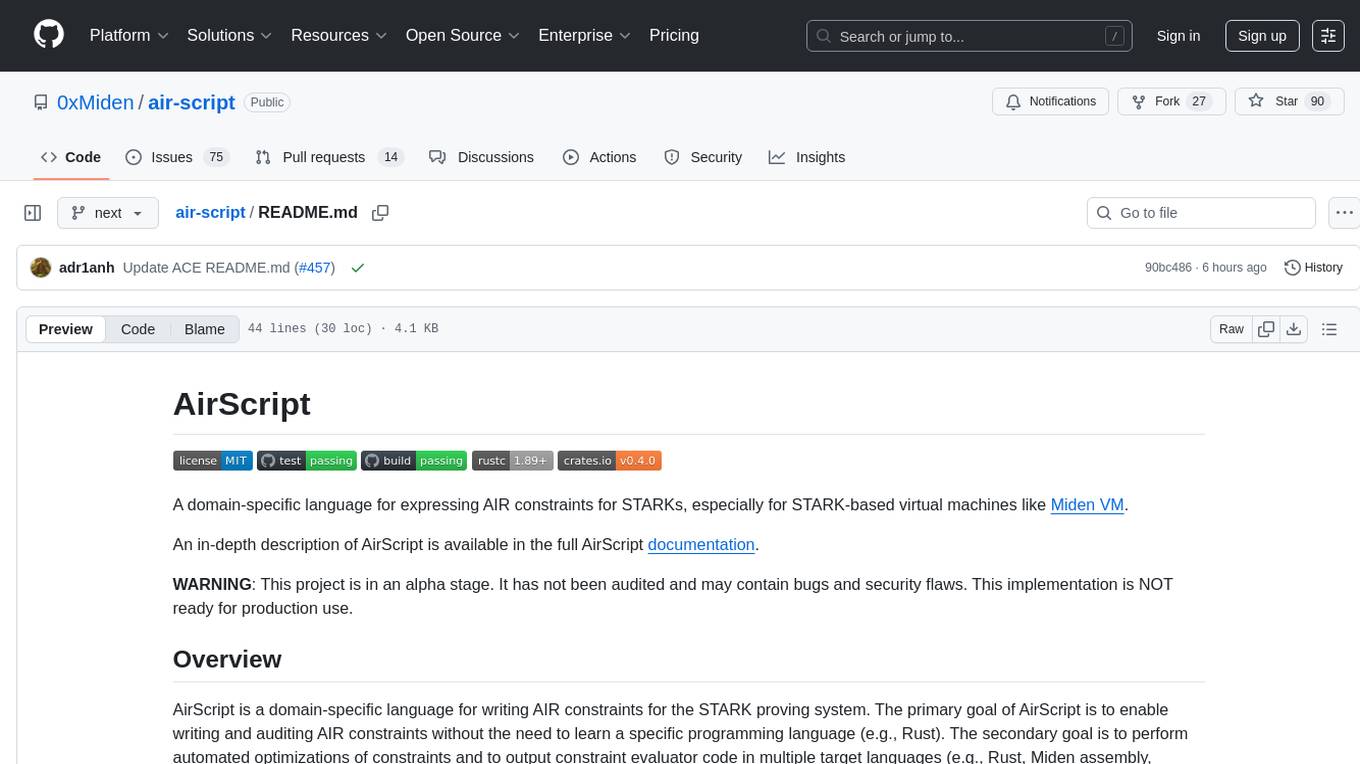
air-script
AirScript is a domain-specific language for expressing AIR constraints for STARKs, with the goal of enabling writing and auditing constraints without the need to learn a specific programming language. It also aims to perform automated optimizations and output constraint evaluator code in multiple target languages. The project is organized into several crates including Parser, MIR, AIR, Winterfell code generator, ACE code generator, and AirScript CLI for transpiling AIRs to target languages.
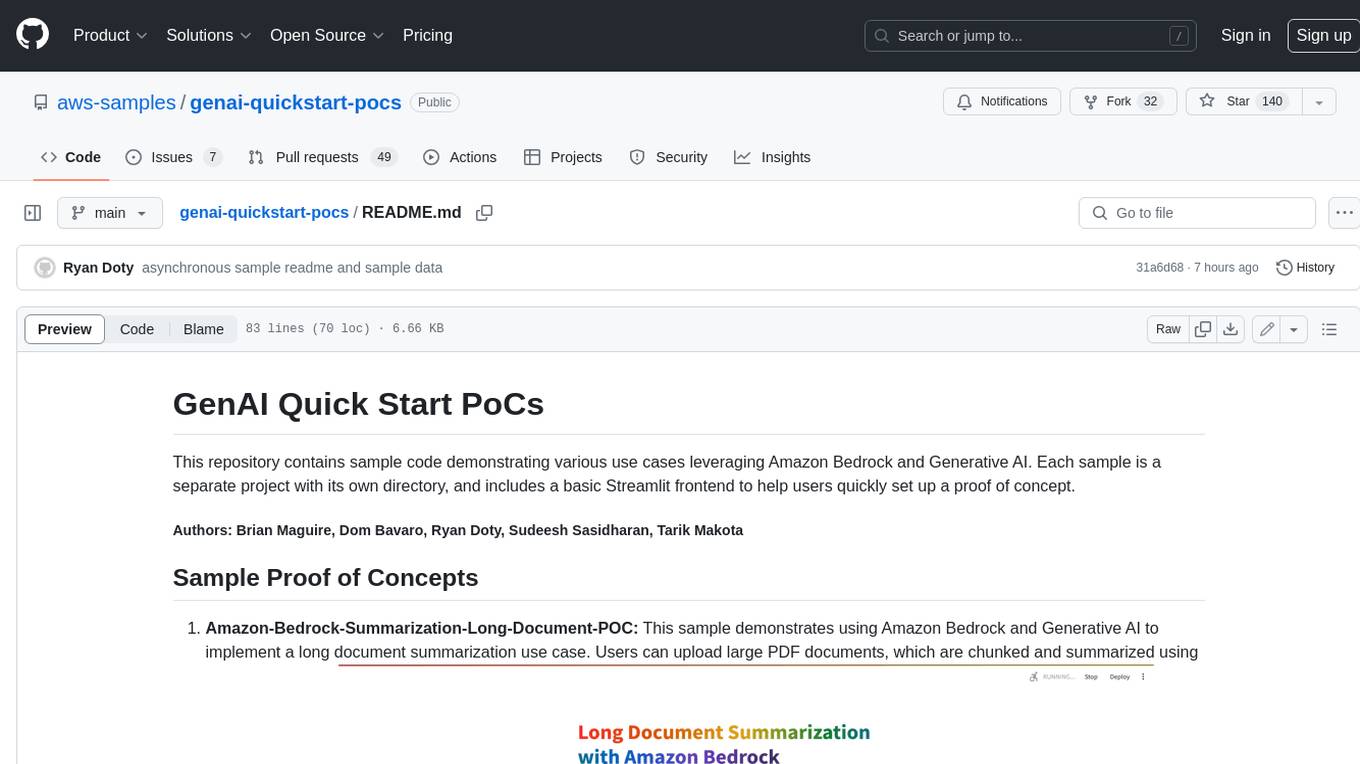
genai-quickstart-pocs
This repository contains sample code demonstrating various use cases leveraging Amazon Bedrock and Generative AI. Each sample is a separate project with its own directory, and includes a basic Streamlit frontend to help users quickly set up a proof of concept.
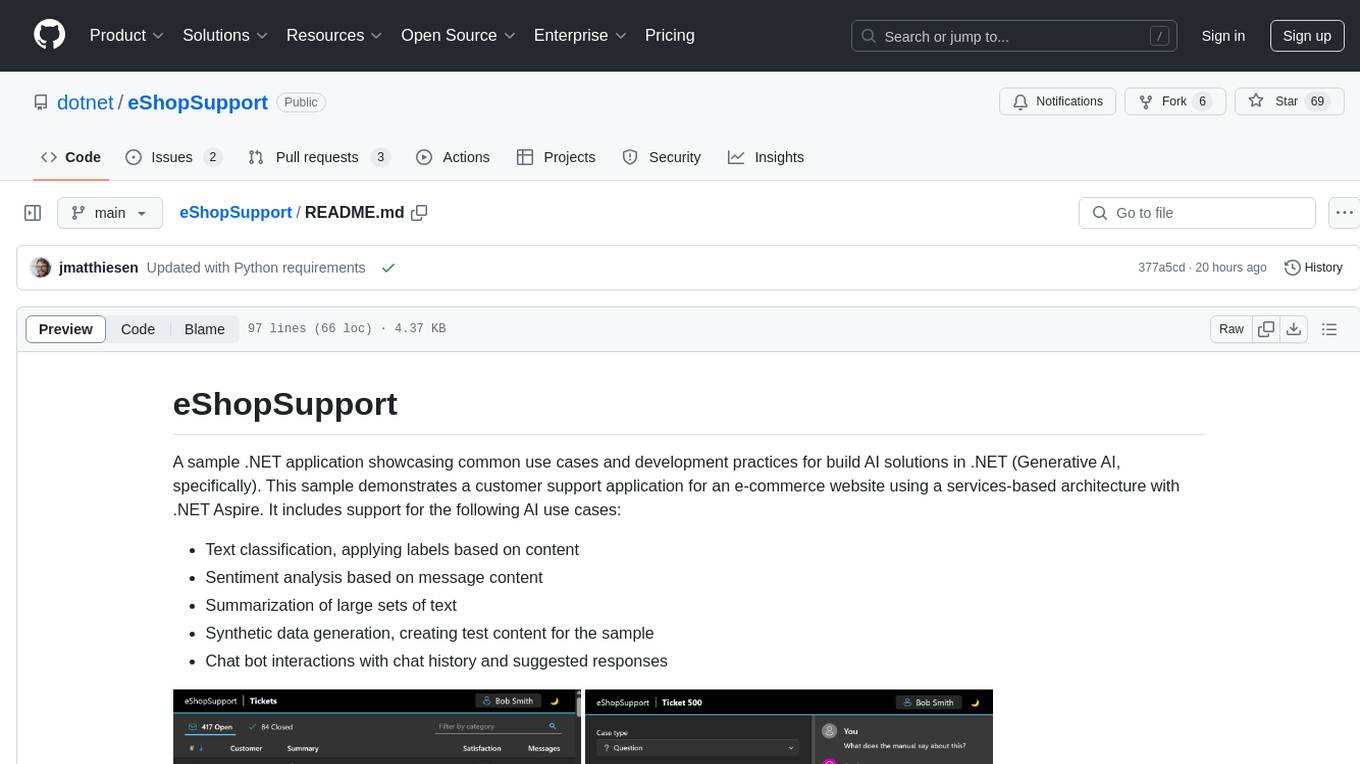
eShopSupport
eShopSupport is a sample .NET application showcasing common use cases and development practices for building AI solutions in .NET, specifically Generative AI. It demonstrates a customer support application for an e-commerce website using a services-based architecture with .NET Aspire. The application includes support for text classification, sentiment analysis, text summarization, synthetic data generation, and chat bot interactions. It also showcases development practices such as developing solutions locally, evaluating AI responses, leveraging Python projects, and deploying applications to the Cloud.
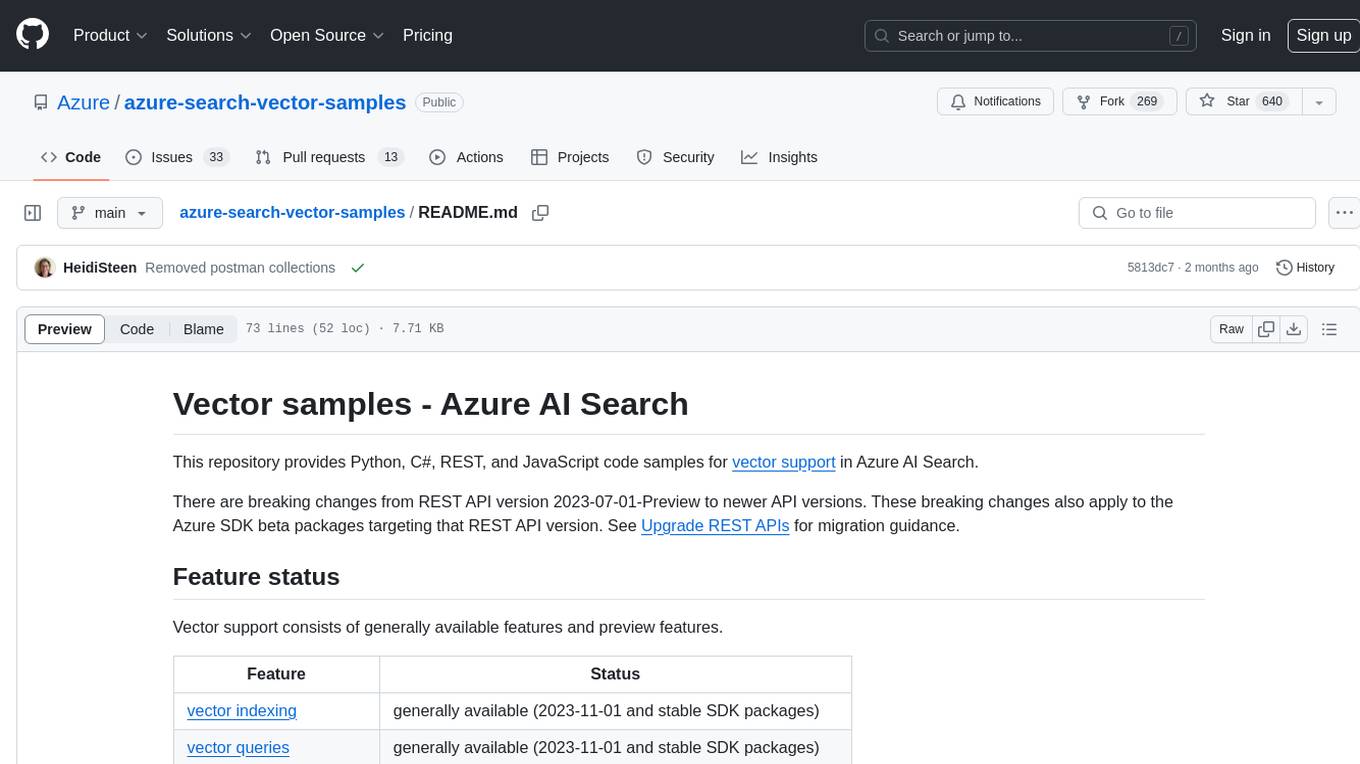
azure-search-vector-samples
This repository provides code samples in Python, C#, REST, and JavaScript for vector support in Azure AI Search. It includes demos for various languages showcasing vectorization of data, creating indexes, and querying vector data. Additionally, it offers tools like Azure AI Search Lab for experimenting with AI-enabled search scenarios in Azure and templates for deploying custom chat-with-your-data solutions. The repository also features documentation on vector search, hybrid search, creating and querying vector indexes, and REST API references for Azure AI Search and Azure OpenAI Service.
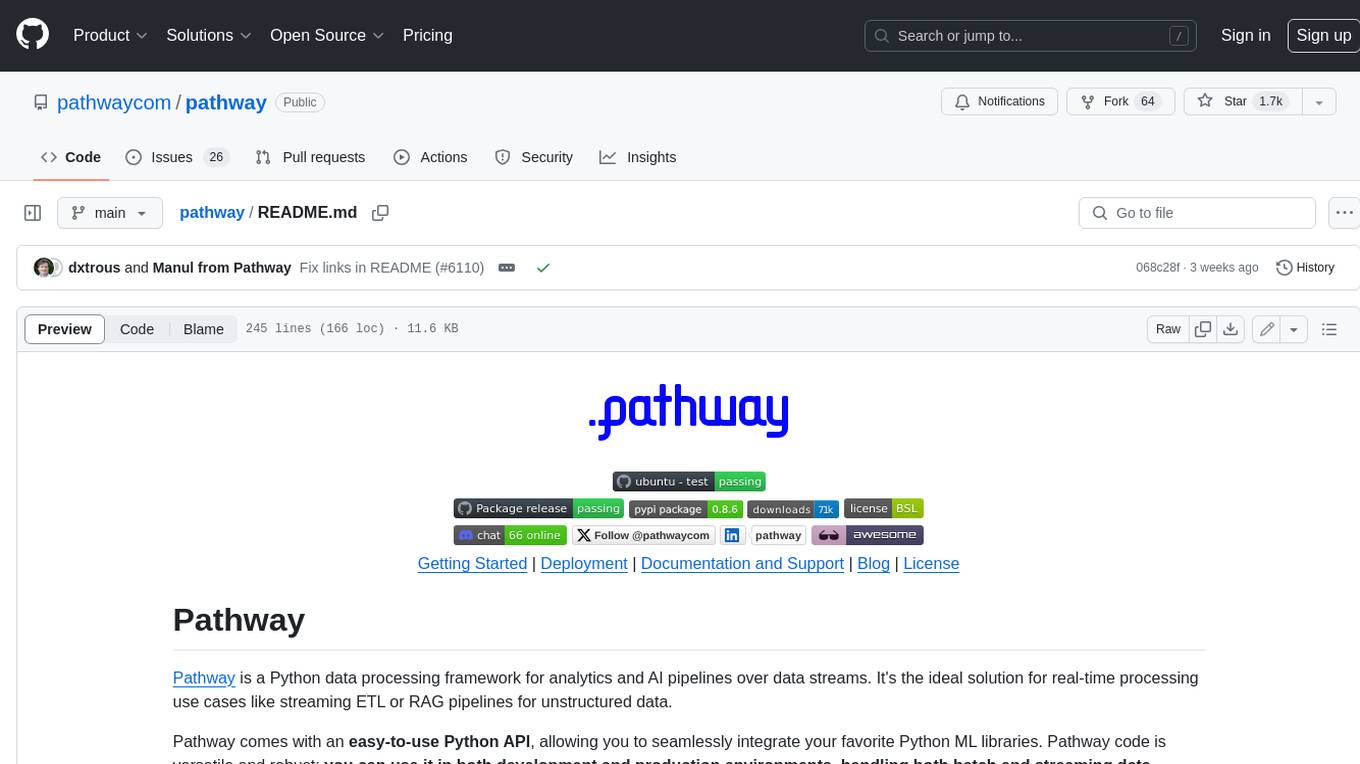
pathway
Pathway is a Python data processing framework for analytics and AI pipelines over data streams. It's the ideal solution for real-time processing use cases like streaming ETL or RAG pipelines for unstructured data. Pathway comes with an **easy-to-use Python API** , allowing you to seamlessly integrate your favorite Python ML libraries. Pathway code is versatile and robust: **you can use it in both development and production environments, handling both batch and streaming data effectively**. The same code can be used for local development, CI/CD tests, running batch jobs, handling stream replays, and processing data streams. Pathway is powered by a **scalable Rust engine** based on Differential Dataflow and performs incremental computation. Your Pathway code, despite being written in Python, is run by the Rust engine, enabling multithreading, multiprocessing, and distributed computations. All the pipeline is kept in memory and can be easily deployed with **Docker and Kubernetes**. You can install Pathway with pip: `pip install -U pathway` For any questions, you will find the community and team behind the project on Discord.
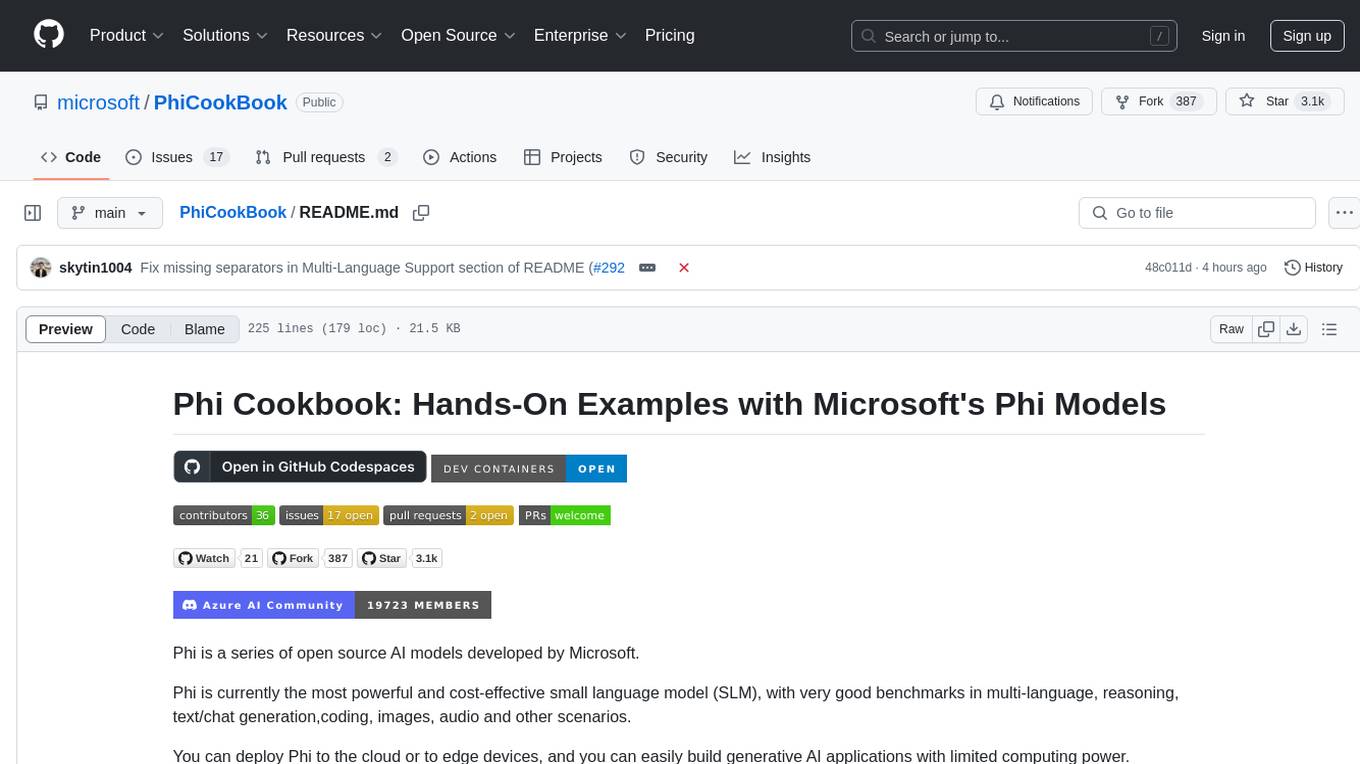
PhiCookBook
Phi Cookbook is a repository containing hands-on examples with Microsoft's Phi models, which are a series of open source AI models developed by Microsoft. Phi is currently the most powerful and cost-effective small language model with benchmarks in various scenarios like multi-language, reasoning, text/chat generation, coding, images, audio, and more. Users can deploy Phi to the cloud or edge devices to build generative AI applications with limited computing power.
For similar tasks

generative-ai-cdk-constructs
The AWS Generative AI Constructs Library is an open-source extension of the AWS Cloud Development Kit (AWS CDK) that provides multi-service, well-architected patterns for quickly defining solutions in code to create predictable and repeatable infrastructure, called constructs. The goal of AWS Generative AI CDK Constructs is to help developers build generative AI solutions using pattern-based definitions for their architecture. The patterns defined in AWS Generative AI CDK Constructs are high level, multi-service abstractions of AWS CDK constructs that have default configurations based on well-architected best practices. The library is organized into logical modules using object-oriented techniques to create each architectural pattern model.
For similar jobs

minio
MinIO is a High Performance Object Storage released under GNU Affero General Public License v3.0. It is API compatible with Amazon S3 cloud storage service. Use MinIO to build high performance infrastructure for machine learning, analytics and application data workloads.

ai-on-gke
This repository contains assets related to AI/ML workloads on Google Kubernetes Engine (GKE). Run optimized AI/ML workloads with Google Kubernetes Engine (GKE) platform orchestration capabilities. A robust AI/ML platform considers the following layers: Infrastructure orchestration that support GPUs and TPUs for training and serving workloads at scale Flexible integration with distributed computing and data processing frameworks Support for multiple teams on the same infrastructure to maximize utilization of resources

kong
Kong, or Kong API Gateway, is a cloud-native, platform-agnostic, scalable API Gateway distinguished for its high performance and extensibility via plugins. It also provides advanced AI capabilities with multi-LLM support. By providing functionality for proxying, routing, load balancing, health checking, authentication (and more), Kong serves as the central layer for orchestrating microservices or conventional API traffic with ease. Kong runs natively on Kubernetes thanks to its official Kubernetes Ingress Controller.

AI-in-a-Box
AI-in-a-Box is a curated collection of solution accelerators that can help engineers establish their AI/ML environments and solutions rapidly and with minimal friction, while maintaining the highest standards of quality and efficiency. It provides essential guidance on the responsible use of AI and LLM technologies, specific security guidance for Generative AI (GenAI) applications, and best practices for scaling OpenAI applications within Azure. The available accelerators include: Azure ML Operationalization in-a-box, Edge AI in-a-box, Doc Intelligence in-a-box, Image and Video Analysis in-a-box, Cognitive Services Landing Zone in-a-box, Semantic Kernel Bot in-a-box, NLP to SQL in-a-box, Assistants API in-a-box, and Assistants API Bot in-a-box.

awsome-distributed-training
This repository contains reference architectures and test cases for distributed model training with Amazon SageMaker Hyperpod, AWS ParallelCluster, AWS Batch, and Amazon EKS. The test cases cover different types and sizes of models as well as different frameworks and parallel optimizations (Pytorch DDP/FSDP, MegatronLM, NemoMegatron...).

generative-ai-cdk-constructs
The AWS Generative AI Constructs Library is an open-source extension of the AWS Cloud Development Kit (AWS CDK) that provides multi-service, well-architected patterns for quickly defining solutions in code to create predictable and repeatable infrastructure, called constructs. The goal of AWS Generative AI CDK Constructs is to help developers build generative AI solutions using pattern-based definitions for their architecture. The patterns defined in AWS Generative AI CDK Constructs are high level, multi-service abstractions of AWS CDK constructs that have default configurations based on well-architected best practices. The library is organized into logical modules using object-oriented techniques to create each architectural pattern model.
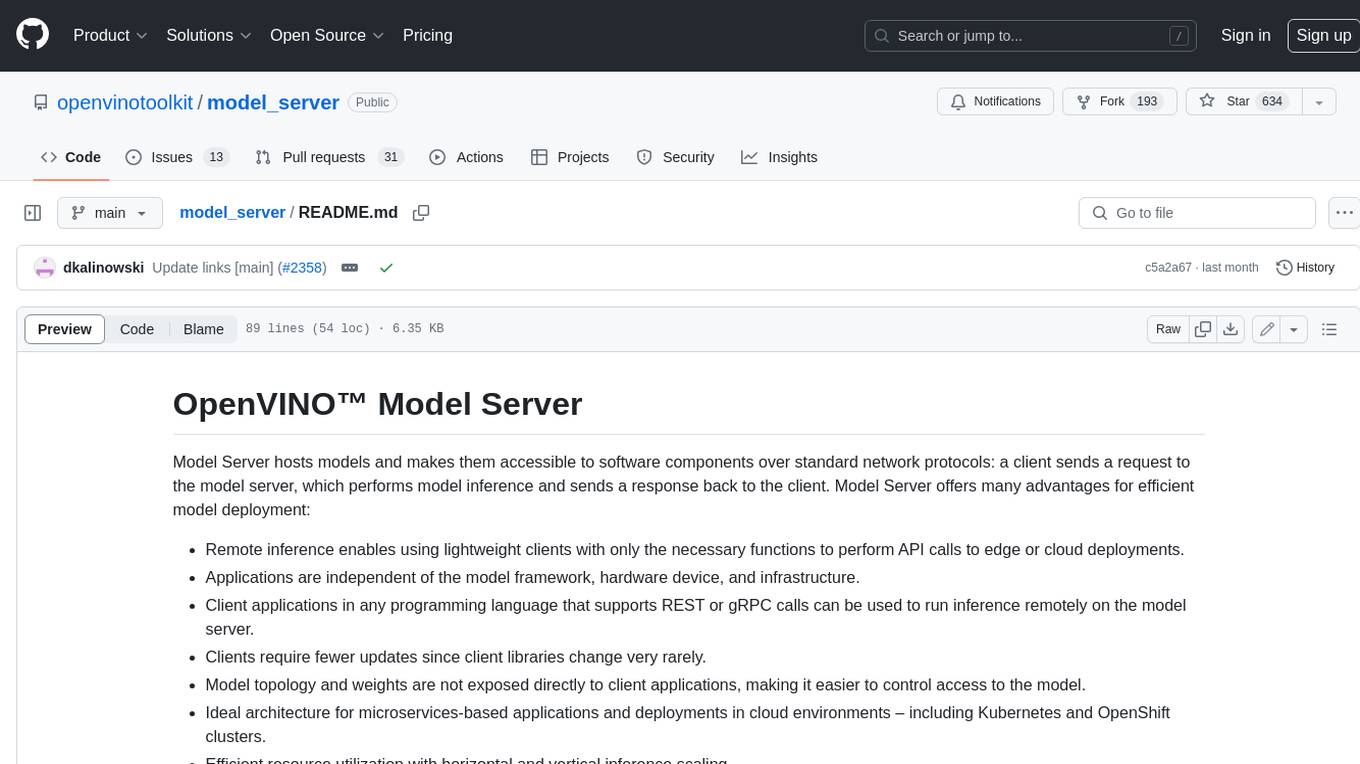
model_server
OpenVINO™ Model Server (OVMS) is a high-performance system for serving models. Implemented in C++ for scalability and optimized for deployment on Intel architectures, the model server uses the same architecture and API as TensorFlow Serving and KServe while applying OpenVINO for inference execution. Inference service is provided via gRPC or REST API, making deploying new algorithms and AI experiments easy.
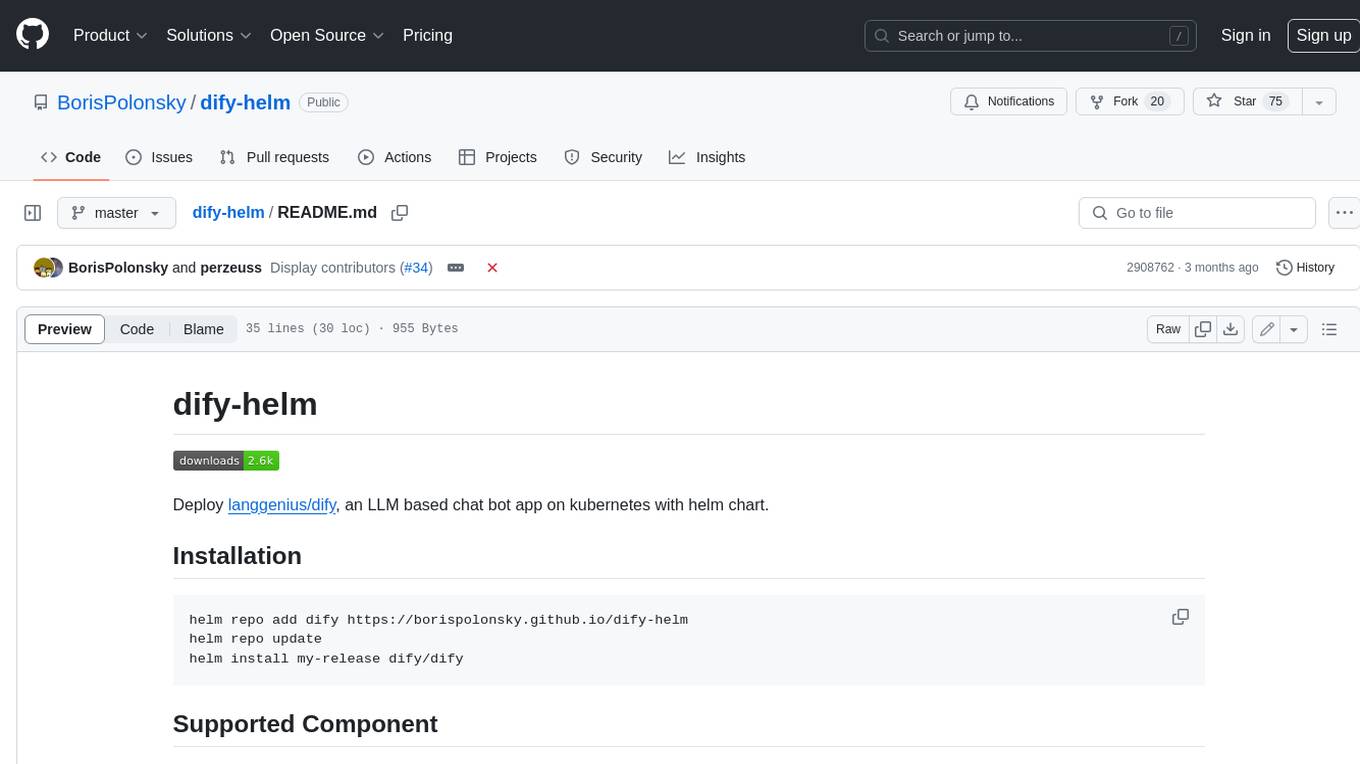
dify-helm
Deploy langgenius/dify, an LLM based chat bot app on kubernetes with helm chart.









